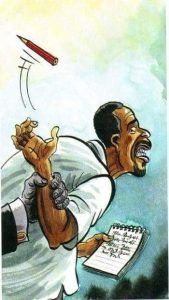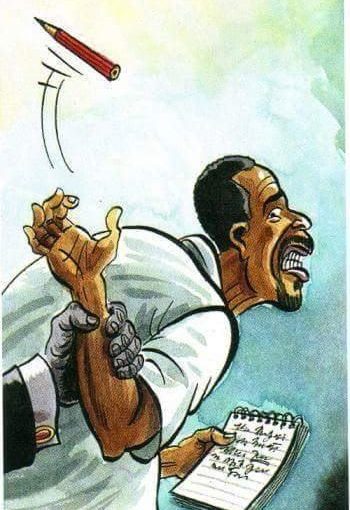 Journalism in Transition in The Gambia: The Threat is their Conscience?
Journalism in Transition in The Gambia: The Threat is their Conscience?Journalists must never be an” Impotent Observer” but a” Potent Observer.”
“It’s impossible to carry the torch
of truth through a crowd without
singing somebody’s beard.”
Georg C. Lichtenberg;
Alagi Yorro Jallow.
Fatoumatta: Ethics (the term comes from the Greek word ethos: custom or practice) is a branch of philosophy whose purpose is to describe moral sentiment and establish norms for good and fair behavior. In the context of journalism, this is a question about what is good and what is right journalistically.
The challenge for Gambian journalists today is to understand the intricate transition underway and move ahead with as little skills and experience as they have. This is because political freedom has been one of the biggest threats to journalists in the Gambia. The threat to journalists during the heydays of dictator Yahya Jammeh was their conscience. So the challenge today in a democratic dispensation is to decide what is right and wrong and balance the ethical dilemma of journalism and politicians. Sometimes, national priorities might interfere with what ordinarily would be good journalism. So Gambian journalists face a crisis of decision, of conscience, and the dilemma of ethical standards concerning political reporting. Still, they have acquitted themselves well, maintaining high standards set by their predecessors during Yahya Jammeh’s war with the private media resulting in journalists who went to prison, exiled, and killed only to defend the truth and what is right.
A Chicago journalist and humorist named Finley Peter Dunne once said, more than a century ago, that “the job of the newspaper is to comfort the afflicted and afflict the comfortable.” In other words, journalists have no obligation to comfort the comfortable. Instead, their duty is to afflict the comfortable or, if you like, to be “uncompromising” to the comfortable.
Asking questions that get a politician’s dander up and inflaming a politician’s passions is a prized skill in journalism. Here is why: Politicians reveal the most headline-worthy information when reporters cause them to lose control of their emotions. Loss of emotional control forces them to depart from their scripted, predictable, choreographed, and often mendacious and bland performances. It is precisely because so many reporters asked a “though question” (which is a charlatan’s term for a great question) that an otherwise unremarkable news conference is now grist for social media and editorial mills. Journalists must not do well as publicists or act as a propagandist or PR for politicians.
Malcolm Muggeridge once said, “News is anything anybody wants to suppress; everything else is public relations.” Unfortunately, many Gambian “journalists” are public relations practitioners polluting a noble craft. That is why some of them apologized to an emotionally disturbed mental midget for asking him a legitimate, probing question.
I, like every journalism teacher worth the name, teach my journalism students the skill to ask politicians trenchant questions that have the capacity to cause the politicians to throw tantrums because politicians, in divisive toxic politics, such as we saw ins news conferences, histrionics is not normal, let reporters guards down and involuntarily divulge the truth. Smart politicians know this. Instead of allowing themselves to be immobilized by impotent anger, they respond to high-pressure, “embarrassing” questions with poise, and disarm adversarial reporters with humility, grace, and gentleness.
Fatoumatta: When it comes to covering politics, journalists often unearth information that the politicians do not want them to know, but in the Gambia, journalists only publishing the information the politician wants made public is little more than a press officer or a peddler in propaganda.
The objective journalist is prepared to risk all to print uncomfortable truths, can back up their stories with undeniable facts, and is committed to exposing incompetence, venality, lies, and corruption. This, I think, is precisely what Thomas Jefferson meant when he placed such a high value on the role of newspapers (the media) in society.
It is crucial that journalists understand themselves and their motives and subscribe to and apply a set of editorial ethics that ensures that all they do is honesty and integrity.
The temptation will always be to court, to woo, and to befriend the politicians. Some journalists might think that by adopting that strategy, they are likely to be privy to more information and achieve an advantage over their competition (selling newspapers or winning the air time ratings is also a colossal media motivation). However, closeness has its dangers.
If a politician is your friend, you may find it difficult to expose them or criticize and write about them in an honest way. So, a critical question for political journalists is the distance they maintain from the politicians they are writing about. However, of course, this distance will vary, depending on the state of the political system.
If you live in a rotten polity, your duty as a journalist is to expose its rottenness to the public gaze. Furthermore, please do not let those who preach ‘constructive’ or ‘positive’ journalism prevent you from doing this. However, the difficulty of keeping your distance from the politicians is a practical one. How far can you go in your reporting? Can you remain free? Can your newspaper, radio, or TV station stay in business? Are you in danger?
Fatoumatta: In other words, I hold the view that a journalist must never be an “Impotent Observer.” On the contrary, journalists can be very “potent” and have proved this many times in exposure to corruption or human rights abuses, among other things. The power of independent journalism manifests core normative roles, namely a monitorial, a facilitative, a radical, and a collaborative role. These roles are not necessarily mutually exclusive but do point to different ways journalism is positioned in society.
However, journalism has a public purpose in a legal sense. It is to obtain and distribute news about events of public interest, take a position on them, apply criticism to them, and contribute to shaping public opinion. Through this, journalism takes on a significant task in democracy. It has special rights (the right to refuse to divulge sources or claim information from authorities) and special duties. The most important responsibility is to report fully and correctly, ensuring that all news is checked over before it is distributed, with attention paid to truth, content, and background information.
In searching for answers to these questions, I assume that democracy is the best government, though afflicted with many weaknesses. A functioning democracy is founded on a communications sector that functions adequately and allows informed public opinion to develop freely. Therefore, in a democracy, journalists have a particular political purpose and responsibility.
Democracy is, above all, a culture of dialogue in which the opinions of dissenters are respected. For example, the highest German court (the constitutional court, the “Bundesverfassungsgericht”) holds that freedom of the press and freedom of speech are the essential elements of a democratic state because only the continuous struggle between opinions and constant intellectual debate will safeguard democracy.
Fatoumatta: In my conviction, responsible journalism presupposes that journalism assumes the characteristics of a profession. In other words, it should have expertise in technical skills and autonomy in the sense of self-regulation through a professional body. Whether journalism has the characteristics of a profession is also at the heart of the discussion on ethics, for professions define themselves through self-regulation and the norms that regulate professional life and their interpretation in exceptional cases. Technical expertise (writing, editing, researching, dealing with technology, etc.) is quite uncontroversial here. On the other hand, there could be considerable difficulties bringing about journalistic autonomy (independence from state control). Politicians strive to control journalism to obtain favorable coverage of their activities. A further controversial point is whether the journalist should be a generalist or a specialist (e.g., science, business, etc.). This is still very close to the yet unresolved argument about whether one must be born a journalist (in other words, to possess certain character traits, such as the ability to endure clashes with politicians).
Fatoumatta: An essential aspect concerning the behavior of journalists is their image of the public. The way journalists see themselves depends on whom they perceive themselves working for – e.g., the public, the “educated” people, the government, the masses who must be educated, or the “stupid masses” who “cannot be educated,” anyway. It also depends on the motivation for working as a journalist – e.g., exposing abuses, eliminating injustice, maintaining confidence in the state, assisting in development processes, entertainment, making money. [ The practice of accepting money or other favors in return for coverage of specific stories can be found the world over; this includes, among other things, positive reviews of products or political information., etc. The way one sees one’s public plays a decisive role (e.g., as stupid and unable to learn, as intelligent and capable of being taught, etc.).
Perhaps Thomas Jefferson was right in suggesting that journalists are more important to society than politicians. Maybe, in some societies, the politicians know and fear that. Perhaps that is where the complications and compromise originate.
Journalists need information, and they often must obtain some of it from politicians. So, the journalist is either put in the position of supplicant to get that information, can negotiate for it, or must go undercover to prize it out. Then, the politician can decide whether to give or withhold the information. When it is a case of investigative journalism, it is far more difficult for the politician to plug every possible leak and cover over every past trial.
The politician has the upper hand in some situations – the release of information they think they control – but not in the case of the release of information that is out of their control. Furthermore, the line between the two categories is increasingly blurred, as we have seen with the WikiLeaks cables’ stories.
Fatoumatta: In the end, however, the challenge, as always, is how to tell the story of the evolving nation. Moreover, that, as we all know, starts with knowing one’s Five W’s and the H, researching, introducing context to the story, and abiding by the ethics of journalism and having done that, being ready to stand by your account and defend it.

